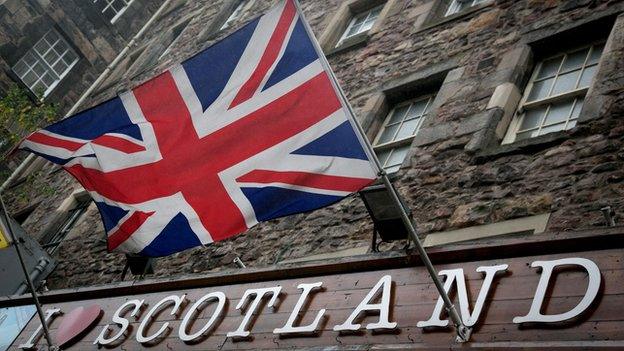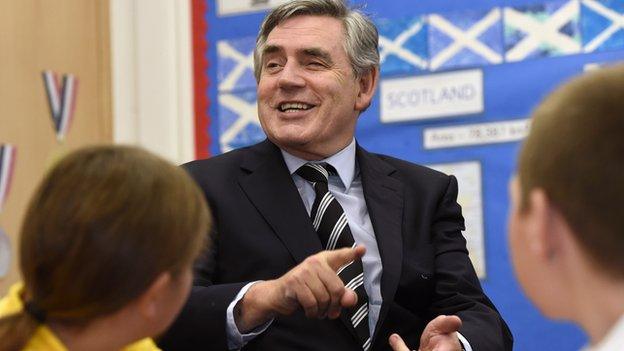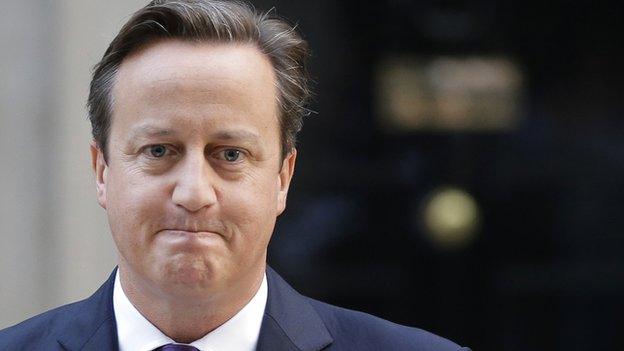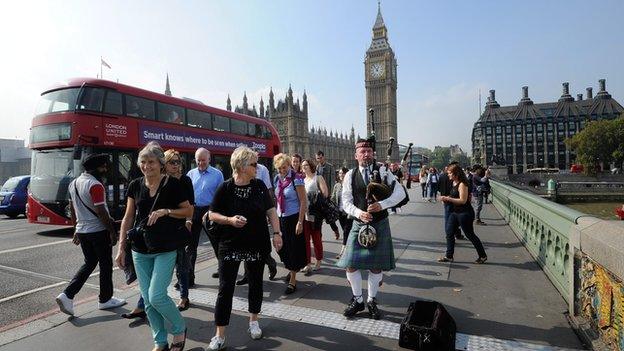Analysis: The Union lives on - now England expects
- Published

The day after the night that has gone - and a few random, disjointed meanderings anent the referendum result which sees Scotland stay within the Union.
For, amid all the reaction and the talk of further reform, that is the primary outcome. Scotland stays in the Union. The UK, as founded in 1707, subject to considerable subsequent amendment, remains in force.
The putative Bill - Act of Union (Repeal) - will no longer be required. The people of Scotland have reached that conclusion, by a majority, after prolonged, extensive and intensive deliberation.
A few words of praise. Congratulations above all to the people for engaging so wholeheartedly in the debate and turning out in remarkable, record numbers to cast their votes.
Congratulations to those who participated in the active element of this democratic exercise. Congratulations to the leading supporters of the Union - the Prime Minister, Alistair Darling - for responding to the result with an absence of bombast and triumphalism. Their responses were dignified and measured.
Moments of emotion
Congratulations to the First Minister. By the close, he saw the final result coming, I am sure. He was prepared. And yet it is to his credit that he contrived to project a positive verdict, without a hint of rancour or name-calling. It was thoughtful and insightful, allied to the customary dry half-smile which Mr Salmond displays in moments of emotion.
Now the practicalities. If there is to be further reform, the spotlight shifts to Westminster. Do not mistake me. The people of Scotland will play a part, a significant part. The Parliament of Scotland will require to be consulted. The political leaders in Scotland - not least from the SNP - will expect a key role.
But the focus still shifts. Yes, there was an awe-inspiring grassroots debate in Scotland. The Yes movement, for example, was much more than the SNP or the other politicians. But it will be difficult to sustain that or to reassemble it, in practical terms, when the task is drafting a legislative response and especially when that task includes considerations outwith Scotland.

Gordon Brown's intervention is credited with doing much to secure victory for the Better Together campaign
Those sundry souls - and politics is always personal, always individual as well as collective - who are about to embark on the next phase of this remarkable debate will require to think about the "family of nations" in the UK, to borrow the phrase of choice from the Union side.
In doing so, it might be helpful to consider the verdict of the people of Scotland. It would be a mistake, in my view, to think that the people of Scotland are now wholly or ineluctably thirled to the Union as presently constituted.
A few enthusiasts apart, they are not about to join in a group rendering of Rule Britannia. Again, do not get me wrong. Scotland has plainly voted against independence and for the Union. But it is conditional and driven by concern rather than uniform, overt enthusiasm.
The people have stepped back from independence. They have concluded, on balance, that they are better within the Union. That was motivated by perhaps three factors: modulated support for the concept of the UK, the notion of solidarity; anxiety about the prospect of independence, of change which by nature contained a degree of uncertainty; and the offer of an enhanced role for Scotland.
Force of personality
All three factors were stressed throughout the campaign - and driven home at the close - by supporters of the Union. Gordon Brown, in particular, by force of personality and sheer dedication, did much to protect the UK.
Throughout the campaign, I listened to the activists. But I also listened to folk in the streets, in the towns and cities. They contemplated independence seriously. They were often open to independence, to varying degrees. But they were anxious, unsure, concerned.
For the third time, do not get me wrong. It was entirely legitimate for supporters of the Union to stress the perceived downsides of independence. They were seeking to negate a proposition, not advance a manifesto of their own. They were right to talk doubt.
But, latterly, they came to conclude that more was needed. Hence the campaign to encourage business people to underpin those doubts. Hence, in particular, the detail - the limited detail - added to the offer of more powers. They did these things because they feared they might lose.

David Cameron is already facing pressure from UKIP over English votes on English laws
Where does that issue of more powers go now? Beyond, I suspect, the lowest common denominator from the three party offers. One point six million people will expect nothing less.
More generally, folk wanted their lives to be better. That poses a particular challenge to Labour - given that it was their leading figures who underline the more powers offer and their potential voters who expressed that demand for an improved Scotland.
Further, where does this issue go, given that the Prime Minister has extended the scope? David Cameron has been rereading his Chesterton. "For we are the people of England that never have spoken yet."
I confess I had not discerned silence from that particular, amicable direction. However, I think GK meant that opinion in England was disparate and inchoate - but, once formed, would be enormously powerful.
Popular disquiet
Mr Cameron is in a position to know of that power, given that he is already facing the UKIP threat over the issue of Europe and popular disquiet thereon. Now that translates into disquiet about relative Scottish clout.
"English votes on English laws" is the cry. A decisive answer to the West Lothian question (different from the historic Labour answer which was "would you please stop asking such an exasperating question."
There has already been an official commission looking at West Lothian. I was told by one UK government minister that a new species of long grass had been devised in which to bury said considerations. The prime minister has now picked up a scythe.
This achieves a range of purposes for Mr Cameron. Firstly, to the good and sensible people of England, it looks like evident reason. Secondly, it extends the debate beyond Scotland, shifting the focus - as I noted - to Westminster.

Thirdly, it may help contain the rumblings of discontent on his own backbenches about the offer to Scotland. And, fourthly, it may - I stress, may - wrong foot the Labour Party.
Why? Because of the geographical diversity of these islands. Labour draws much of its Westminster strength from Scotland. The Tories have one MP. His constituency may be the size of Belgium - but there is but one.
It is feasible, entirely feasible, that a future Labour prime minister might be able to summon a majority in the UK - but not in England.
With devolution, particularly enhanced devolution, the bulk of legislation at Westminster may be England only or England plus. Could that Labour prime minister sustain a situation where s/he could abide in Downing Street without the capacity to control the Commons on legislation affecting 85 per cent of the UK population, affecting England?
'Too bad, how sad'
If Labour have a potential problem with that, Mr Cameron's response may be: "Too bad, how sad." I imagine he could endure a little Labour discomfiture. It would be a pity - but he would manage somehow.
In that sense, I think this focus upon the people of England is part rational, part instinctive - and part political with an eye to the impending UK General Election. "I, David Cameron, wanted to empower the people of England - and what did I hear from the other side…..exactly!"
So Labour will need to tread carefully in responding. I am sure they will do so, noting Gordon Brown's argument that the concept of unalloyed Westminster sovereignty is fading.
A remarkable night, a remarkable vote. Remarkable consequences.